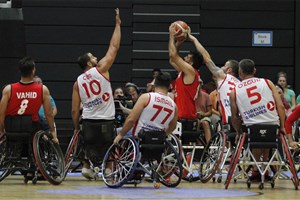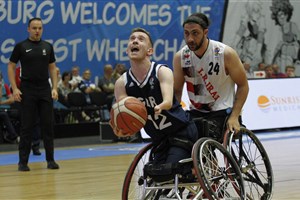
Hamburg 2018 - It's good to be Britain; can it be great?
HAMBURG (Steve Goldberg's Wheel World) - Great Britain recently launched a rebranding campaign but nothing builds a brand better than being the only country to send both its men's and women's teams through to the semifinals of the IWBF World Championships.
Well, there are one or two things, the medals that will be decided this weekend.
Thursday's women's quarterfinals marked the differences between those currently on top, those that want to be, and those who aspire to in either of those groups. Canada, whose dominance in the '90's and early 2000's in both Paralympic and World Championship competition may never be replicated, gave way to a USA run that included the 2010 Worlds, 2004, 2008 and 2016 Paralympic Games.
Germany broke the American Paralympic run with a win in 2012. Can they win their first world championship on home soil? Not if the Netherlands finally break through. The bronze medalists from the 2014 will be disappointed with anything less than gold.
The Dutch will play China with Germany going against Great Britain . The men's semifinals feature a matchup of the defending World and Paralympic champions in Australia versus the USA. Great Britain will faceIran.
Canada-China
There will be a new world champion on Saturday when the final whistle blows on the women's tournament. China defeated the 2014 winners from Canada 63-56 in the first quarterfinal of the day.
The Canadians were a good team in Toronto four years ago, but they played great and took the energy of the home crowd to the top. Two years after Rio, it's a new team developing towards Tokyo 2020.
Canada just couldn't catch up to the women's wheelchair basketball team from China. They lost their quarterfinal match with a score of 56-63. @WCBballCanada pic.twitter.com/zOXJ8o0kgI
— CDN Paralympic Team (@CDNParalympics) August 23, 2018
"It’s a young team. We only have one starter who played in Rio on this team. It’s all players who need playing time and minutes against good teams to be better at this level," said Canada head coach Marc Antoine Ducharme. "This experience helps us to grow up as a team. We still have two big years to improve and be ready for Tokyo."
That starter he mentioned is Cindy Ouellet who led Canada with 23 points and 9 rebounds.
It was only a 3-point margin in China's favor at the half but the top team from the Asia Oceania zone is consistent and disciplined. Turnovers and defensive mistakes were taken advantage of and China led by 12 going into the fourth. A late run cut the margin but could not win the day.
China was led by Xuemei Zhang and Guidi Lyu with 16 points each with Haizhen Cheng and Wenli Chen adding 12 apiece.
 The Texas Towers, Rose Hollermann and Abby Dunkin, try to terminate Amy Conroy's shot. (Photo by Steve Goldberg/SCS Media)
The Texas Towers, Rose Hollermann and Abby Dunkin, try to terminate Amy Conroy's shot. (Photo by Steve Goldberg/SCS Media)
Great Britain-USA
Looking towards Tokyo is something both Great Britain and the USA are doing. Great Britain, however, started this process heading towards Rio while the Americans are just getting started after a veteran team won gold in Rio.
So it was little surprise when the USA took it on the chin from Great Britain in a quarterfinal battle of the red, white and blues, 67-47.
Battles between the USA men and GB are the stuff of legend, but the women's slate has been more one-sided. "For us, it's a massive win," noted Brit coach Miles Thompson, who was on the American bench at London 2012.
Thompson knows exactly what his friend and USA counterpart is feeling these days. It wasn't that long ago when Thompson left his position as head coach at the University of Alabama in 2013 to take the same title on the national level with British Wheelchair Basketball.
"What they're doing, I've done with Great Britain."
 Trooper Johnson, USA and Miles Thompson, Great Britain (Photos by Steve Goldberg/SCS Media)
Trooper Johnson, USA and Miles Thompson, Great Britain (Photos by Steve Goldberg/SCS Media)
He had a few veterans but knew that he must aggressively develop new talent to be successful down the road. That showed dividends with the women's highest placing ever in Rio and put them into the conversation here in Hamburg.
Johnson, who was an assistant with the gold medal winning American team in Rio, has only two players – Rose Hollermann and Abby Dunkin - from that squad here with him in Germany. The average of the team is only 20.5 with several players still competing on the junior level in the NWBA. All but one, possibly two of this team could represent the USA in the IWBF U-25 World Championship.
"We have a good group of young athletes," Johnson told me after the game. He was pleased with their progression. "They are completely different from what we started with in January."
"I thought they played really well today," said Thompson. He said that the areas where he thought they might exploit the young Americans didn't materialize and, "I thought we responded well."
London and Rio vet Rose Hollermann hit 11 of 17 shots on the way to 23 points, equaling the scoreline of GB's Helen Freeman. Morgan Wood, playing in her first international tournament, has been a stalwart for the Americans and added 15. Amy Conroy dropped in 13 for GB.
"They are learning what it means to be an elite athlete. It's one step in the process towards Tokyo." - USA coach Trooper Johnson
Thompson added this advice. "You've got to have a belief in the process and a belief in yourself (to see it through). You've got to be able to deal with the inevitable adversity because you know it's coming. Not just deal with it but come out stronger."
Netherlands-France
The outcome of this one was never going to be a question. The Orange Angels are anything but to their opposition which might substitute the word devil in it its place.
After 10 minutes it was 26-8, after 20, they actually improved, only losing the quarter 16-8. There is no shame in that for France. The Oranje Crush has inflicted that kind of pain on much stronger teams. It would end 79-36.
Mariska Beijer has been one of the best female players in the game. Hold on, let me adjust that to "one of the best players". She can hold her own on any court.
Bo Kramer is still a teenager – she'll be 20 next month – and but already being mentioned in discussions of the next great players. She was in Rio at 18, only playing the game for about four years at the time, but already playing a big part in the team.
 This Orange Angel is a devil in disguise, the Netherlands Bo Kramer. (Photo by Steve Goldberg/SCS Media)
This Orange Angel is a devil in disguise, the Netherlands Bo Kramer. (Photo by Steve Goldberg/SCS Media)
Going into the quarterfinal, she was averaging 20 points, 13.4 rebounds and 5.8 assists per game. She hit 20 points in the first 20 minutes of this game and finished with 23. (As I'm writing this during the match, Kramer just dropped in a 3 from NBA distance…)
At this tournament she says she sees so much room to improve. "I'm learning every single minute."
"I'm learning form every player here, every game," she says, her enthusiasm as vibrant as her game.
Germany-Spain
For the first time, both German teams were playing at the same time, enticing fans and team officials to scurry between the two courts.
While the German men were handling Korea in a placement game, the ladies of Spain turned out to be a tougher nut to crack than I expected and were down only 9 to the home team at the half. Spain were showing that their win over a depleted Australia was not without merit.
And they were playing with nothing to lose, compared to the higher expectations from Germany… and the home crowd.
 Catharina Weiss shoots for Germany. (Photo by Steve Goldberg/SCS Media)
Catharina Weiss shoots for Germany. (Photo by Steve Goldberg/SCS Media)
Germany prevailed, boosting the lead to 16 points after three quarters and winning by 26 at the end, 59-33.
Would this challenge better prepare them for the next game, a semifinal against Great Britain than the Dutch rollover on France? To be determined.
On to the semifinals.
Steve Goldberg
FIBA
FIBA's columnists write on a wide range of topics relating to basketball that are of interest to them. The opinions they express are their own and in no way reflect those of FIBA.
FIBA takes no responsibility and gives no guarantees, warranties or representations, implied or otherwise, for the content or accuracy of the content and opinion expressed in the above article.
To help make this column as inclusive as possible, please send any national or international event information, story suggestions, or comments to wheelworldmail@gmail.com.
























